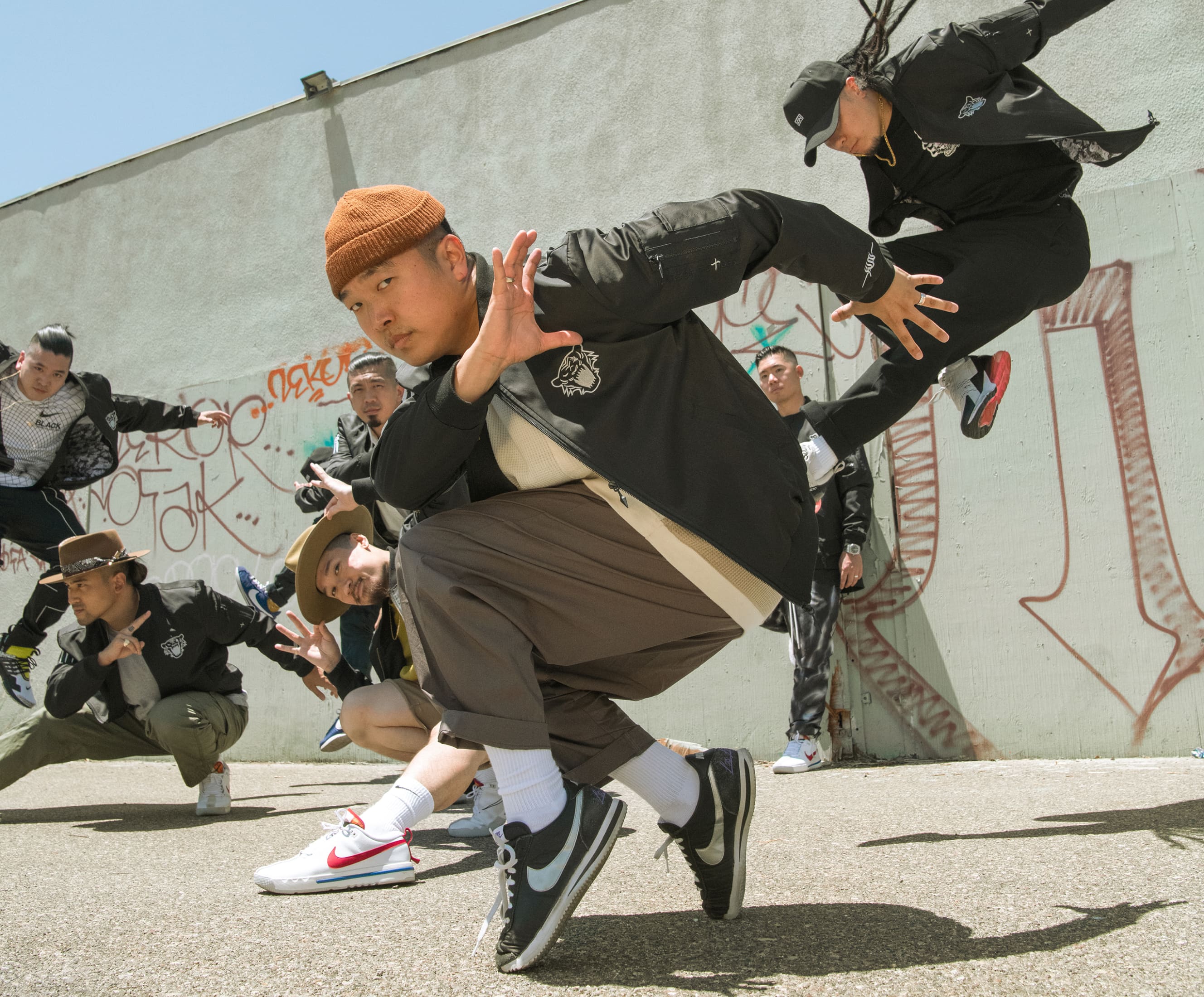‘We’re a Family of Movement Ninjas’
Athletes*
Learn how this dance crew stays together by prioritizing ‘kin at all costs.’

Kinjaz co-founder Mike Song and crew in Downtown Los Angeles.
Whenever the Kinjaz get together, they share a subtle sign of their connection to each other as a dance crew and as lifelong friends. It’s a signature hand signal of two fingers joined as one, pointing in the same upward direction. And for several of the group’s founding members, it reveals a shared finger tattoo – the symbol for kin. “It represents the idea of moving together towards the same goal as one unit,” says Mike Song.
Sitting on the floor of a rehearsal studio in Downtown Los Angeles, the co-founders have a natural choreography to their back-and-forth as they retrace their steps together over the years. Founded in 2010, they quickly built a reputation on national TV for their precise routines. “It started as this just-for-fun, meet-up-at-barbecues, and just perform-in-little-community-shows kind of thing,” says Mike. “Now it’s become a global brand.”
This is a modal window.
“Our shared objective is to cultivate ‘kin at all costs.’”


The group’s name neatly combines what matters most to them. “Kin means family, but it’s also the [Greek] root word for movement, as in kinetic. And so, ‘family of movement ninjas’ is how we fused it together to make Kinjaz,” explains Mike.
“Our shared objective is to cultivate ‘kin at all costs,’ to support and elevate each other to reach our highest collective potential,” says Anthony Lee.
That sense of unifying purpose is especially important with so many different entrepreneurial strands to their brand: They also have a clothing line, a live-events production arm, even a noodle company. But the consistent beat that keeps it all together is dance.
“What I find refreshing is, when we’re totally stressed out, coming into a space and finding time to session — just dancing, playing good music, having fun,” says Vinh Nguyen. “That's centering for us, to just remember why we do it. It's for each other and it's for the love we have for dance.”


“Dance transcends barriers…brings people together.”
Through their ever-expanding reach online and through their arena shows, the group finds ways to incorporate storytelling that connects with their audience and encourages them to move. “Dance transcends barriers, whether it be gender norms, sexual orientation, nationality, ethnic background, or language,” says Anthony. “Dance brings people together.”
“Dance is one of the oldest sports of all time, and there's a universal connection to dancing that everybody has,” says Ben Chung. “A baby will hear music and start jumping up and down. Then you take that to the level of breaking [breakdancing] being in the Olympics for the first time in 2024…There’s such a spectrum.”
“Plus it’s the most accessible sport,” says Addy Chan. “Unlike other sports, where maybe you need a lot of resources, money for equipment, or a field, or a pool, dance is open to everybody.”


And every kind of body. “There are a lot of sports where you need to be a certain body type,” says Mike. “The unique thing about dance is that whatever body you were born with, that is your tool. Maybe you’re skinny and maybe that doesn't work for other sports, but when you start to dance, you realize, ‘I’m noodly, I could work with this!’ Or for anyone who might be self-conscious, maybe you have big legs and you realize, ‘I have great balance!’ and you start utilizing that.”
With everything they have going on, what’s the Kinjaz’ next move? Well, for the past three years they’ve been working “in the shadows” on a secret project with Nike that launches soon.

Film: Aimee Hoffman
Photography: Thalia Gochez
Words: Dan Rookwood
Reported Date: July 2021